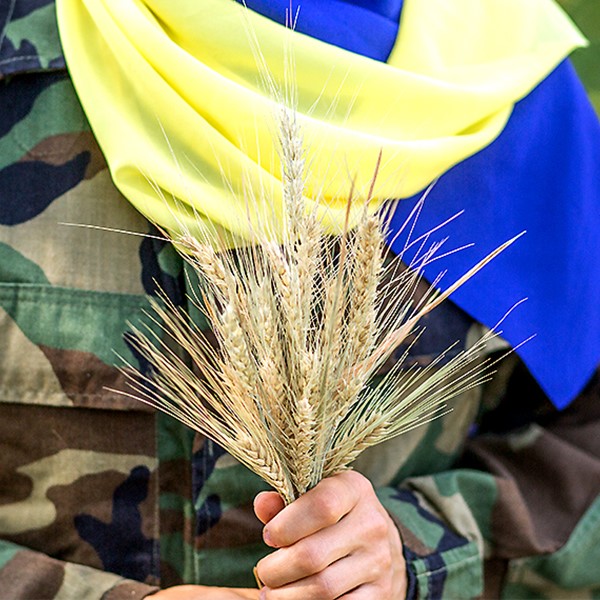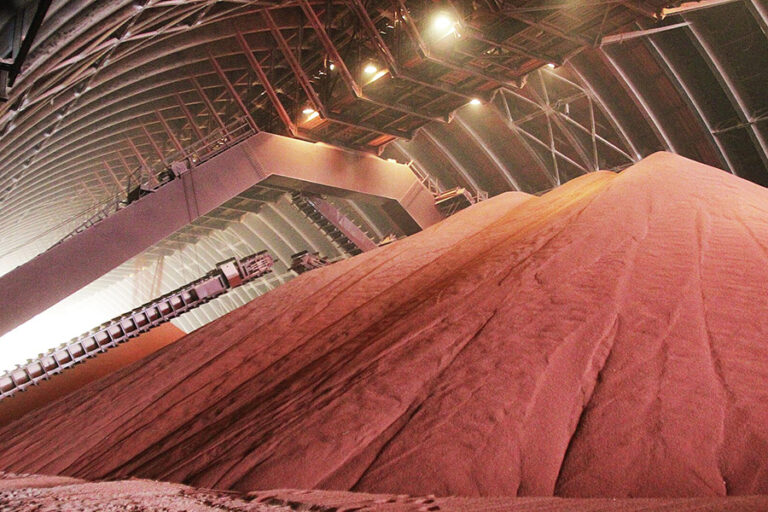
Russia’s invasion of Ukraine could potentially trigger the global food crisis. The Russian military constantly shells the main seaports of Ukraine, as well as a large swath of areas of agricultural significance. According to the UN Secretary-General, the lack of Ukrainian food could push the world to the brink of a humanitarian disaster.
Both Ukraine and Russia have traditionally been key figures in the global agricultural market. As mentioned by Bloomberg, the total share of Ukrainian and Russian wheat accounts for nearly 30% of the global market. Food security in Asia, Africa, and the Middle East depends on the volume of grain imports from Ukraine and Russia. The dependency of Egypt, typically one of the world’s largest wheat importers, stands at 80 percent.
In 2020, the total value of Ukrainian wheat exported to Africa amounted to more than 1.45 billion dollars, of which 610 million dollars were paid by Egypt. In total, sales of agricultural products abroad account for 40% of Ukrainian export revenues.
During the first two weeks of the full-scale war, the prices of higher-quality bread surged by 50%, while Turkey has almost no reserves of sunflower oil left.
In 2021, Ukraine set an absolute record for the harvest of grain and oilseeds, collecting more than 107 million tons. It’s evident that due to the active hostilities, the destruction of agricultural equipment and fuel reserves, and the delay of sowing campaigns (in some regions it’s impossible to even start one), it will be extremely difficult to repeat the successes of the previous years. Moreover, experts and market players expect a decrease in this year’s crop yields by an average of 43%.

The sowing campaign, which began in April and relies on agricultural work in February and March, is being jeopardized. Active military operations in Ukraine may lead to more than 30% of agricultural fields remaining unsown in 2022.
Russian troops are deliberately destroying grain storages and targeting farming equipment, Ukraine’s Main Directorate of Intelligence of the Ministry of Defence says. As of the beginning of April, the main agricultural regions of Slobozhanshchyna, Tavria, Podniprovia and Zaporizhzhia remain at the heart of high-intensity warfare.
Ukraine traditionally holds high-level positions in the global sunflower oil market (it constitutes 15% of all Ukrainian exports). As a result of the disruption from the sowing campaign, the domestic sunflower oil industry will face the most severe challenges. The prices of sunflower oil, grain, cereals, and corn continue to rise on the global markets. Between February 24th and March 24th, the price of wheat futures on the Chicago Stock Exchange increased by 18%.

On March 9th, Ukraine banned the export of certain cereals, grains, and other products to prevent food shortages. The official resolution forbids the export of oats, millet, buckwheat, sugar, salt, rye, cattle, and meat. However, the export of wheat, meslin (a mixture of wheat and rye), corn, chicken meat, and eggs is not prohibited. Still, the export of the above-mentioned goods is allowed only if they’re subjected to the specified declarative licensing.
The Ministry of Agrarian Policy and Food assures that the amount of food is more than sufficient for this year. However, consumers of Ukrainian products abroad are facing a sharp deterioration in their alimentary situation.
The price of fuel needed for agricultural equipment has increased due to the constant shelling of fuel depots in Ukraine. It’s reported that the shortage already amounts to 85%. This means that Ukraine currently has only 15% of the fuel required for the work of agricultural machinery. Previously, it was bought in Belarus and Russia. There were also significant reserves at fuel bases that are now hit by Russian missiles.

The key Ukrainian seaports that are located in Odesa, Kherson, Mykolaiv, and Yuzhne (port Pivdennyi) are currently closed. Entry and exit of ships is temporarily impossible, which means that we cannot export food, nor receive fuel and mineral fertilizers. A number of ports partially transport their produce by road and rail. For instance, since the end of March, we have been exporting grain to Europe by train. The blockade of ports due to Russian aggression and disruption of logistics resulted in a tenfold decrease in export volumes of wheat: from 200-300 thousand tons to approximately 20 thousand tons per day. Maritime exports account for half of the overall structure of Ukrainian exports.

The Russian agricultural market also faces hard times, as the export of Russian grain remains relatively low due to the hazards of shipping by sea. Russia will also be significantly affected by the termination of cooperation with the largest container shipping companies that account for one-third of the global market (such as Maersk, MSC, Hapag-Lloyd, Mediterranean Shipping Company and CMA CGM). In the coming seasons, Russia’s yield indicators will decrease significantly due to the withdrawal of major foreign suppliers of agricultural machinery. The problem with grain exports will affect Russian farmers too.

Another example is that, as a result of sanctions imposed by EU countries, the Russian and Belarusian agricultural sectors have purchased approximately 15-20% of the required sugar beet seeds. As sugar has largely disappeared from the shelves in Russia and Belarus, the confectionery market will also take a hit. Even now, the Russian stores have large queues of people fighting each other over one-kilogram packs of sugar.
By mirroring Western sanctions, Russia and Belarus, as one of the leading producers of potassium salts, decided to change the situation in the global fertilizer market. In 2022, the expected shortage of potash (potassium salts needed for fertilizer production) will amount to nearly 17 million tons, or about a third of world production. In the near future, such sanctions will lead to a decline in crop yields and higher food prices.


slideshow
The main importers of Russian fertilizers are European countries. In addition to potash, Russia also caused a shortage of nitrogen fertilizers (without nitrogen fertilizers, the yield of some crops may be halved). In the fall of 2021, due to Putin’s anomalous prices on gas (which is the major component of nitrogen fertilizer’s cost), some European fertilizer plants closed, and fertilizer prices rose by 300% over the year.

But this is only the beginning of the problem.
According to the UN and WFP (the world’s largest intergovernmental humanitarian organization), Russia’s invasion of Ukraine could put some half a billion people on the verge of starvation in the next two years. The UN’s Food and Agriculture Organization states that prices of food and fodder could rise by more than 20% due to the war in Ukraine.
Previously, the food shortages from the Black Sea Economic Cooperation members (consists of 12 countries, Ukraine and Russia included) could be countered by products from South America. Nonetheless, due to climate change and the sharp cooling of the Pacific Ocean off the coasts of Peru and Chile (the La Niña climate phenomenon), Central and South America have been suffering from droughts and crop failures for the second year in a row.
This means that in the coming years, a significant number of residents of North Africa and South Asia will not be able to buy enough food.
These are primarily people in Yemen, Bangladesh, Pakistan, Lebanon, and Tunisia, where many people depend on government subsidies for basic products. The sharp rise in bread prices could lead to not only mass famines but also political protests, as happened in 2011 during mass street protests, revolutions, and internal military conflicts in the Middle East and North Africa, known as the Arab Spring.
“The war in Ukraine is already disrupting supply chains and causing prices for fuel, food, and transport to rise sharply. We must do everything we can to prevent mass starvation and the collapse of the global food system,” said UN Secretary-General António Guterres.

The world has not yet recovered from the food crisis caused by the COVID-19 pandemic, but the new challenge could be even more serious. Due to the Russian invasion of Ukraine, 400 million people may starve to death. This is the Kremlin’s cynicism: disrupting the global food system for the sake of dubious political self-affirmation.
The blame for the probable starvation of 1/16 of humanity lies solely with the Russian Federation, whose actions grossly violate international order.
Russia’s war against Ukraine is not just a regional conflict, but a threat to food security around the world.

